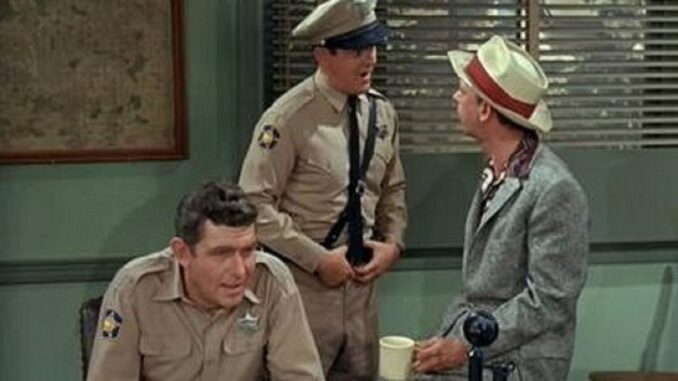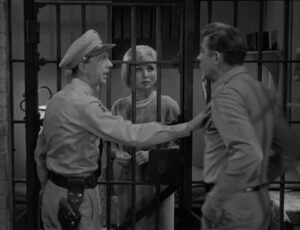
During The Andy Griffith Show‘s eight-year run on CBS from 1960 to 1968, the U.S. endure a traumatizing stretch in its history. The assassination of President John F. Kennedy in 1963, the civil rights movement, and the Vietnam War changed the nation forever. Yet, the town of Mayberry carried on, seemingly ignorant to events that thrashed the world about.
Here’s how the comedy about life in a small North Carolina town endures through the cultural change that rocked the rest of the planet.
‘The Andy Griffith Show’ acknowledged no real-world events
An insulated world unto itself, Mayberry seemed too good to be true: (mostly) obedient children, contented townspeople, the occasional band concert, and all the pie you could want. The uneventful professional lives of the town’s law enforcement officers were a testament to peaceful Mayberry, where there was not even a whiff of the change in the air happening in the rest of the nation.
“There is something iconic, something quintessentially American, about The Andy Griffith Show,” writes Daniel de Visé, author of Andy and Don: The Making of a Friendship and a Classic American TV Show. “The program appeared at a moment of dramatic flux in American society.”
The show, by design, wasn’t meant to take on the cultural upheaval of the day.
“It was a time of assassinations, electrified music, and slackening standards on sex and drugs,” he continued. “Yet, the Griffith Show refused to embrace those changes, or even to acknowledge them. Instead, the program trains its gaze backward, revisiting and reviving the rural Americana of the 1930s, the time of Andy’s childhood in North Carolina and Don [Knotts’] in West Virginia.”

The ‘Andy Griffith Show’ episode that captures the essence of Mayberry
Considered one of the 1960s comedy’s best episodes, “Man In a Hurry” featured guest star Robert Emhardt as harried out-of-town businessman Malcolm Tucker, whose car breaks down in Mayberry on a Sunday. Life there has wound down even more on the weekend and the executive despairs at being stuck in the town where, to his view, time appears to have completely stopped in its tracks.
Unable to even make a phone call because of the elderly Mendelbright sisters’ all-day phone chat tying up the town’s only phone line, Tucker lost his patience.
“Outrageous!,” Tucker bemoans. “Sheer idiocy! I can’t believe this is happening to me. A public utility being tied up like this. You people are living in another world! This is the 20th century, don’t you realize that? The whole world is living in a desperate space age. Men are orbiting the Earth. International television has been developed. And here, a whole town is standing still because two old women’s feet fall asleep.”
Fans love escaping to Mayberry
As de Visé wrote, “The Griffith Show helped viewers recall a simpler time Americans, helped them reconnect with their own past, at a moment when desperately needed the reminder. As Technicolor chaos swirled around them, millions of viewers embraced the black-and-white tranquility of [the show] and held on tight.”
At the end of the 1986 television movie Return to Mayberry, Andy Griffith reprising his role of course as Sheriff Andy Taylor closed out the final gathering of almost the entire cast with words that could not be more apt.
“There’s something about Mayberry and Mayberry folk that never leaves you,” Griffith said. “No matter where life takes you, you always carry in your heart the memories of old times and old friends. So here’s to all of us. Old friends.”
